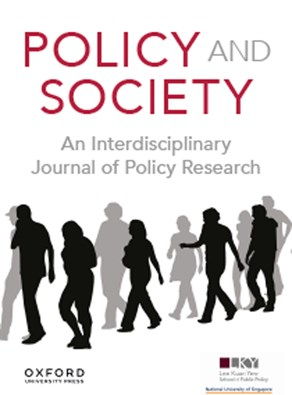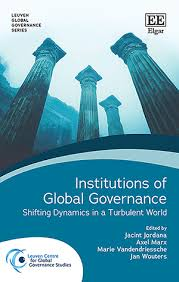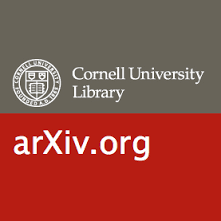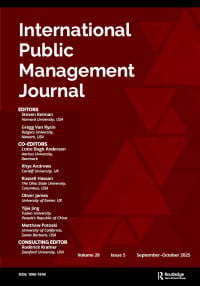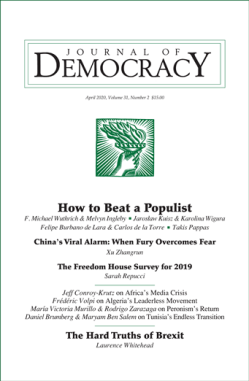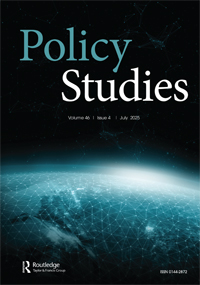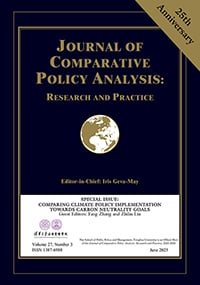-
24 Oct 2025 • Journal Article • Policy and Society
Intermediation in policy and politics: rethinking the architecture and process of governance Open Access
AbstractThis article introduces the multifaceted roles of intermediaries in policy and governance processes. Intermediaries are organizations and actors that bridge the gap between the public and private sectors. They help resolve conflicting interests, transfer knowledge across different sectors and organizational levels, and facilitate policy coordination and collaboration
… show more -
23 Oct 2025 • Book Chapter • Institutions of Global Governance - Shifting Dynamics in a Turbulent World
Global financial governance: public good under fragmentation
AbstractFinance is among the most influential activities in our economies and societies. Financialisation – the embeddedness of finance into our social, economic, and political life – is progressing. Large parts of finance are being determined and performed on the global level. We point out the ‘public good’ qualities of global financial governance. Stability is the prominent
… show more -
12 Oct 2025 • Preprint • arXiv
FactAppeal: Identifying Epistemic Factual Appeals in News Media
AbstractHow is a factual claim made credible? We propose the novel task of Epistemic Appeal Identification, which identifies whether and how factual statements have been anchored by external sources or evidence. To advance research on this task, we present FactAppeal, a manually annotated dataset of 3,226 English-language news sentences. Unlike prior resources that focus solely
… show more -
12 Oct 2025 • Preprint • arXiv
You're Not Gonna Believe This: A Computational Analysis of Factual Appeals and Sourcing in Partisan News
AbstractWhile media bias is widely studied, the epistemic strategies behind factual reporting remain computationally underexplored. This paper analyzes these strategies through a large-scale comparison of CNN and Fox News. To isolate reporting style from topic selection, we employ an article matching strategy to compare reports on the same events and apply the FactAppeal
… show more -
8 Oct 2025 • Journal Article • International Public Management Journal
The role of exogenous macro shocks in shaping the appeal of government employment
AbstractStudies of individuals’ attraction to work in the public sector overlook the likely effect of perturbations to the national-level context. Advancing this research agenda, this article examines whether and how a national crisis shapes attraction to government employment over other sectors. Drawing on the established “rally ‘round the flag effect,” we expect a national
… show more -
4 Oct 2025 • Journal Article • Journal of Democracy
What Political Scientists Owe Democracy
AbstractThis essay explores the distinctive role of political scientists in defending democracy during democratic crises, emphasizing their professional responsibility to safeguard democratic institutions. Drawing upon the engagement of Israeli political scientists in widespread protests against democratic backsliding, beginning in January 2023, it proposes a model of scholarly
… show more -
17 Sep 2025 • Journal Article • Policy Studies
Grassroots fiscal centralization: subnational delegation of revenue authority in Argentina
AbstractThe concept of delegation offers scholars of federalism a novel analytical framework for examining previously overlooked aspects of fiscal centralization. Adopting a bottom-up approach, we develop a taxonomy of delegation types to assess the dynamic evolution and feedback effects of key milestones of fiscal centralization in Argentina, a developing federation with
… show more -
21 Aug 2025 • Preprint • arXiv
HebID: Detecting Social Identities in Hebrew-language Political Text
AbstractPolitical language is deeply intertwined with social identities. While social identities are often shaped by specific cultural contexts and expressed through particular uses of language, existing datasets for group and identity detection are predominantly English-centric, single-label and focus on coarse identity categories. We introduce HebID, the first multilabel
… show more -
1 Aug 2025 • Journal Article • Journal of Comparative Policy Analysis: Research and Practice
Consenting to Centralization? Comparing the Subnational Delegation and Abdication of Fiscal Authority in Argentina and Australia
AbstractWhy do some subnational governments consent to the centralization of fiscal authority? This article’s explanatory framework is built on the cases of Argentina and Australia. It adopts an inverse perspective to explain why subnational entities in these two cases assented to revenue centralization during moments of sudden economic change. In the case of Argentina, subnational
… show more -
28 Jul 2025 • Preprint • arXiv
Dialogues of Dissent: Thematic and Rhetorical Dimensions of Hate and Counter-Hate Speech in Social Media Conversations
AbstractWe introduce a novel multi-labeled scheme for joint annotation of hate and counter-hate speech in social media conversations, categorizing hate and counter-hate messages into thematic and rhetorical dimensions. The thematic categories outline different discursive aspects of each type of speech, while the rhetorical dimension captures how hate and counter messages are
… show more
